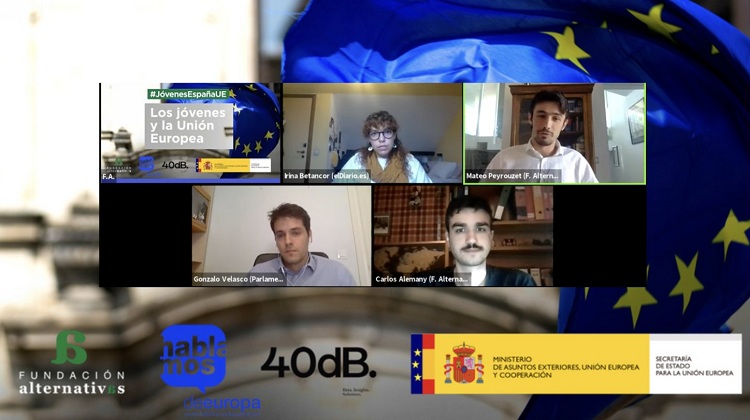Eduardo González
66% of young Spaniards consider themselves “quite” or “very pro-European” despite the strong impact that the last international crises (the financial crisis of 2008 and the coronavirus) have had on the youth, which has resulted in a labor market marked by precariousness and in the forced emigration of many of them to find an opportunity abroad.
“We have seen the chaining of two crises that have especially hit young people, whose prospects were already quite diminished before the coronavirus”, said yesterday the coordinator of the Foreign Policy Observatory of the Alternativas Foundation, Mateo Peyrouzet, during the telematic presentation of the report Los jóvenes y la Unión Europea (Young people and the European Union), conducted last June by the company 40dB for the Alternativas Foundation among 800 Spaniards aged 18 to 35 years.
The survey, which is also part of the program Hablamos de Europa launched by the Secretary of State for the EU, reveals that two thirds of young Spaniards continue to identify with the European project, compared to 18% who consider themselves “little” or “not at all” linked to the EU. However, this feeling has fluctuated in the wake of the coronavirus crisis, with 18% of those surveyed seeing their attachment to the European Union grow recently, while for 25% it has decreased.
In any case, the survey reveals that most young Spaniards continue to find “many advantages in living within the EU”, such as the possibility of “traveling freely for work or studies without visas or red tape” or the existence of a “democratic space and the rule of law”, explained Carlos Alemany, of the Alternativas Foundation, who summarized the results of the survey during the same event. “Young Spaniards feel tremendously European”, he added.
One of the most significant conclusions of the study is that, for young Spaniards, the main priorities are related to their daily material life, such as emancipation, housing prices, employment or pensions, to the detriment of other major current challenges, such as the environment or gender inequality. In addition, and related to this, respondents stated that the highest priority issues should be managed primarily at the “national level”, while the other issues, which are not as high a priority, should be managed equally at the “national and European level”.
This order of priorities, which is quite different from that observed in other European countries (especially those in the center and north, more concerned about climate change), “highlights the harsh reality”, according to Gonzalo Velasco, public opinion analyst at the European Parliament. “Our generation is the one that has lost the most with the last crises” and is more concerned about “material issues, urgent problems, such as unemployment, emancipation or job insecurity.” “In other countries that have these problems more resolved there are other priorities”, such as climate change (in which a “tremendous gap” of twenty points between Spain and other countries can be seen) or gender inequality, in which “Spain is one of the most combative countries, but does not show a special concern and is in the European average”, he added.
For her part, Irina Betancor, political analyst and contributor to elDiario.es, highlighted the fact that young Spaniards count above all on the EU to manage issues such as gender inequality or climate change. “We are facing a Europeanization of public demands with which we manage to politicize young people more, and the fact that they are focused at the European level is very interesting”, she said. Therefore, she said, the survey yields “promising results” that demonstrate the “commitment to the European project”. “In Spain, young people value freedom of movement highly, and this in turn we link it to the perception of Europe as an economic opportunity”, she continued. “The EU is, in a sense, the working and academic future to which many young people aspire”, she added.







